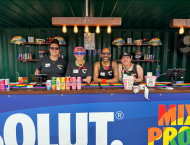Life
 Illustration by James Coreas.
Illustration by James Coreas.
Cannabis Changing in the District: Misconceptions and Battling Big Brother
April 10, 2020 @ 10:00am
In 2014, D.C. local voters rallied together to pass the now-famed, oft-cited Initiative 71. The bill represented a giant step toward fully legalizing the recreational use of marijuana in the District, legislation that would reduce crime and help the plant become less stigmatized. But without statehood, the bill can only do so much for residents, despite their explicit and clear desires regarding the leafy, green plant.
“All of the benefits of legalizing are not able to be actualized,” says Queen Adesuyi, a policy manager at Drug Policy Alliance’s Office of National Affairs. “All of D.C. is enthusiastic about this, they have everything they need to roll out a plan, but Congress is blocking it. It’s still a problem.”
Adesuyi deals with marijuana legalization on a national and local level, and says the federal government often causes interference, preventing an environment like California and Colorado. However, residents voted for what they believed in and there are still laws on the books that protect businesses, medicinal dispensaries and individuals.
D.C. also houses a vocal activist scene with regards to cannabis because of its proximity to the powers that be. The culture surrounding cannabis in the District isn’t dissipating or easing back, but rather heats up and as Congress considers the idea of decriminalizing marijuana on a larger scale, D.C. is more than ready to take advantage in all sectors.
A Booming Business
As of now, the law allows D.C. residents 21 and older to possess up to 2 ounces of marijuana, which they can consume on private property. The transfer of up to 1 ounce of marijuana is also allowed, as long as no money, goods or services are exchanged, according to the mayor’s office.
Following Initiative 71 going into effect in February 2015, a number of businesses began to sprout up in the District. One was lifestyle brand Pink Fox, which opened its doors for business shortly after the bill passed. The company primarily sells products such as T-shirts, backpacks and other accessories.
“Supreme built their company off skateboarders, the aggressive street movement. Kate Spade built their company off the Upper West Side and a particular look,” says co-founder Mark Nagib about the inspiration. “Not every college grad wants to wear a big stoner shirt to their class and grandmothers don’t want to do that either. Bridging that gap became our goal.”
Those kinds of “big stoner” shirts aren’t exactly a prominent feature to D.C.’s scene as a whole, given the city’s proximity to the federal government’s policy makers. Big Brother’s presence notwithstanding, the folks at Pink Fox are able to give minimal amounts of cannabis as gifts that can accompany their products.
“There’s a law on the books, and laws are easily interpreted by legal experts, and as long as you’re operating within that law, you’re good,” Nagib says matter-of-factly. “I understand the conversation about the gray area, but at the end of the day D.C. has a law on the books that allows for medical cannabis and recreational cannabis, and you get to participate if you’re over 21.”
With these laws and apparent loopholes, comes more opportunity for expansion of an already existing culture. Now that brick and mortar spots are viable options for business, the culture has continued to grow exponentially because of people like Nagib.
“There’s a lot of people contributing to it,” he says. “It’s nice to have other recreational means for stress relief. The alcohol industry had a monopoly on that. To have cannabis that is easy to access, and familiar to a lot of individuals, it helps legitimize cannabis. They start to see the stoner mentality in a different way.”
Another business to take root in D.C. in the aftersmoke of 71’s passing was the Daily High Club. Harrison Baum’s idea was simple: Take the business model from Dollar Shave Club, Loot Crate and other subscription services, and use it to send items like pipes, bongs and other tools through the mail.
“The Women Grow event and the DC State Fair were the first cannabis events we ever participated in,” Baum says.
The grass was greener on the West Coast, where he’d eventually move his company. Now based in Los Angeles, there is no stigma to the industry he participates in, a level of understanding he failed to get in the DMV.
“Part of the move was, to be blunt, the culture in D.C. wasn’t as supporting, we weren’t able to find as many people to collaborate with. It was very taboo still,” Baum says. “From a personal perspective, two to four years ago, people gave you a weird look, whereas in California people don’t think twice about it. I had friends that were weary of talking to me about this.”
The sensation of taboo has eased since the move, Baum notes, as he’s noticed a huge uptick in regards to the promotion of products involving cannabis and THC. Part of the shift is because of regular staples like the National Cannabis Festival, set to take place this year on September 19, which helps educate people on local and national issues.
“Things like that play a much bigger role than people think,” Baum says. “The first one was the first time I’d ever seen someone smoke in public and the fact that the festival happened without any violence or issues, it opened eyes. I think it’s definitely changed people’s perspectives.”
Policy
Adesuyi first took interest in the D.C. cannabis culture when she was a student at Georgetown University. There, she performed extensive research highlighting the city’s use of racial and social justice as a campaign tool on both sides of the marijuana issue.
“They wanted to legalize because of the racial injustice and racial arrests disparity,” Adesuyi says. “I’m originally from the Bronx, so I left a place that was overpoliced to move to Georgetown. I was in D.C. during Initiative 71, and I saw those experiences put forth in a campaign. People care about the plant and the medicine, but most people came to the table because of the stark racial disparities here. That was a strategy that got people.”
Another motivating factor for people was the hope that D.C. could one day join states like California and Colorado, with fully realized dispensaries open to the public. This hasn’t happened yet, largely because of the federal government’s inclusion of a prohibition in federal spending bills that disallows any bill legalizing or regulating marijuana sales in D.C. since 2015.
“Because of the budget rider, it’s insulated the D.C. cannabis community from seeing what it could truly look like,” Adesuyi says. “With a gray market, it’s decriminalized, but there’s no real testing happening on the products. Not to mention, people are still being criminalized and that racial disparity still remains, with more arrests for possession with intention to distribute.”
Despite these roadblocks, she says the current Congress is easily the most cannabis-friendly and forward in U.S. history and points to people taking notice of “the sky not falling” every time a new state votes to legalize recreational use of marijuana.
“Overall, we are at the height of cannabis reform,” Adesuyi says. “Moving progressive marijunana reform is an all-hands-on-deck dynamic. The local cannabis culture in D.C. is robust with so many people coming to the table for so many reasons.”
Covid-19 and Cannabis
The prohibition in the annual spending budget expires in September 2020, which in theory provides time to ensure that it’s excluded in the next one, however Covid-19 has halted all forward momentum.
“If Covid-19 didn’t happen, I’d have a completely different response for you,” Adesuyi says. “This year, it’s so hard to talk about what’s happening because it’s disrupted a lot. It’s unclear to me what the appropriations process will even look like this year, because normally it would start now. Our process to lift up the rider is being directly affected by the coronavirus.”
As people began to close themselves in and socially distance in early March, it was already hard to get those same people through the doors of businesses. And on March 30, D.C. Mayor Muriel Bowser advised residents to shelter in place and a number of businesses like Pink Fox were forced to close doors for good as they were deemed “non-essential.”
“We’re not dealing with it any longer, we’ve been ordered to shut down and we support that 110 percent,” Nagib says. “I can say I’m disappointed that my small business is closed, but it’s not anyone’s fault. I don’t disagree with what the mayor did.”
From the pause in business to the pause in potential policy changes, the virus has made an impact on D.C.’s cannabis culture, as it has in every other sect of life. But the movement is healthy, picking up steam and is slated to return in full force once it’s again safe to venture outside.
“I think the ultimate dream is to be able to have an Amsterdam-like scenario, where there are legal coffee shops where you can go and spend your money, and do what you’re looking to do,” Nagib says. “Whether it’s to purchase something over the counter, whether it’s to have a burger and a joint at the same time. We’re talking about crime going down, we’re talking about jobs, we’re talking about easing the opioid epidemic.”
Learn more about these organizations and their efforts below.
Daily High Club: www.dailyhighclub.com
Drug Policy Alliance: www.drugpolicy.org
Pink Fox: www.pinkfox202.com







